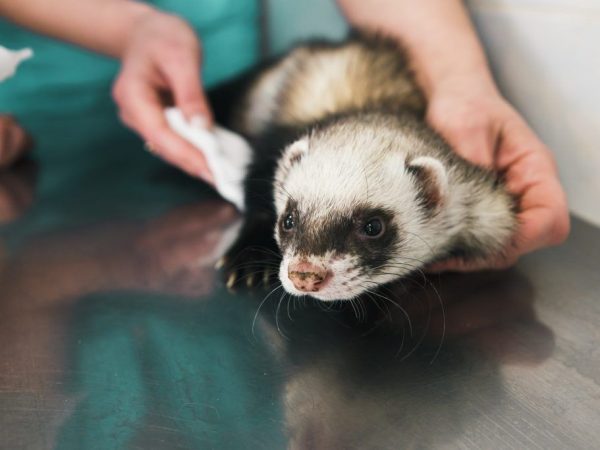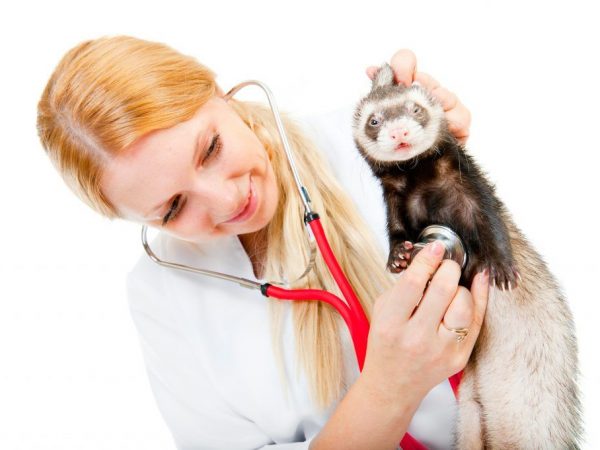When to vaccinate ferrets
Any pet needs timely vaccination. Ferrets are no exception in this regard. Moreover, each owner should know when to vaccinate ferrets and for what diseases.

Vaccinations for decorative ferrets
In this case, it is very important to follow the ferret vaccination schedule, as timely vaccinations will help protect ferrets from serious diseases.
Need for vaccination
In the event that you have a question about what vaccinations a ferret needs to do, first of all, you should figure out whether they will help get rid of various diseases.
One of the most terrible and serious is the plague, which is popularly called the plague. This is a contagious disease that ferrets are very susceptible to. An animal can catch this disease both from its relative and from animals of other species. Even if ferrets are not allowed out into the fresh air and contact with other animals is not allowed, there is still an opportunity to catch this virus. Its penetration is possible through a person's shoes and clothing. If the animal is sick with the plague, it is no longer possible to cure it. In this case, only timely vaccination will help.
Rabies is an equally serious ailment. With this disease, the central nervous system is completely affected in all animals. In this regard, rabies vaccinations are among the most necessary, especially since humans are also susceptible to this disease.

Ferret vaccination
Ferrets can be vaccinated when they are 2-3 months old and only after the first teeth have come out. During the first 12 weeks, certain antibodies are formed in the child's body in the process of feeding on breast milk, which prevent the occurrence of certain diseases. These antibodies are very similar to the cells that should arise after vaccination. Due to this, vaccination during this period is not at all necessary, the body will not respond to such an intervention.
If the antibody status of the adult mother is not known, ferrets can be vaccinated much earlier.
List of required vaccinations
What vaccinations are given to ferrets? In order for a high-quality vaccination to be carried out, there are certain schemes that must be strictly followed. The first scheme provides for the affixing of such vaccinations:
- from the plague (in the period 9-11 weeks);
- from rabies (first performed at 13-15 weeks);
- from one year of age, ferrets are annually vaccinated against plague and rabies.

List of necessary vaccinations
There is also a completely different scheme, which provides for the vaccination of ferrets by age and not only. Such vaccinations include:
- vaccination against distemper (6-8 weeks of a pet's life);
- revaccination against distemper (at 10 weeks);
- vaccination against leptospirosis (at 10 weeks);
- rabies vaccination and revaccination against diseases listed above (11-13 weeks).
As soon as the animal turns 1 year old, re-vaccination is carried out from year to year.
Both schemes have been successfully used year after year and are considered very successful and of high quality. At the same time, ferrets should be vaccinated using imported means, which have already been tested by many.
Preparing the animal
2 weeks before the vaccination, the animal needs to be dewormed. Worms significantly weaken the pet's immunity, and the vaccine, if present, becomes less effective. For this purpose, it is necessary to use special remedies for worms, which are used for small puppies or cats.
Before being vaccinated by age, the ferret must be taken for examination by a veterinarian, because vaccination is contraindicated in sick animals.
The animal must be provided with quality and balanced food.
Once the ferrets have been vaccinated, it is strictly forbidden to give other medications without consulting a doctor. Ferret vaccinations are also prohibited in the following cases:
- if all the teeth have not completely changed;
- if the animal is sick;
- if the ferret is carrying or feeding a baby;
- if worms are found in the body;
- if the operation was recently carried out;
- immediately after using an anthelmintic agent;
- if less than 2 weeks have passed since the last vaccination;
- if the animal has a sharp decrease in weight;
- in the process of taking other medications.
If a ferret with an unknown vaccination history falls into your hands, it is advisable to give the full number of vaccinations. In this case, it is advisable to do this when the animal has lived with you for several weeks.
Algorithm of actions after grafting
As soon as the animal is vaccinated according to age, it is advisable not to immediately run away from the clinic, but to spend some more time there in order to monitor the reaction of the animal's body. Often, animals develop a serious allergic reaction, which only a specialist can cope with.
The main signs of a serious allergic reaction include:
- a sharp increase in body temperature;
- upset stomach and vomiting;
- shortness of breath;
- constantly wandering gaze;
- trembling in the legs and arms;
- a state of depression.
If such symptoms occur, the help of a veterinarian is urgently needed.
Taking care of an animal requires high-quality vaccination, because this is the only way to be sure of the health of your pet.


